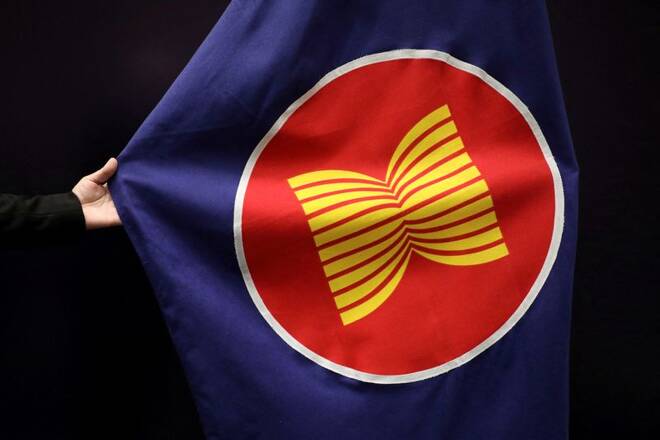Advertisement
Advertisement
Discord over Myanmar as ASEAN postpones year’s first meeting
By:
By Poppy McPherson, Tom Allard and Rozanna Latiff
By Poppy McPherson, Tom Allard and Rozanna Latiff
(Reuters) – Unresolved differences about engagement with Myanmar’s military rulers are causing discord among the Association of Southeast Asian Nations (ASEAN), diplomats and government officials say, as a ministers’ meeting set for this week was pushed back.
The friction follows a tumultuous final few months of 2021 after ASEAN took the unprecedented step of sidelining Myanmar junta chief Min Aung Hlaing from its leaders’ summit in the wake of a military coup and use of deadly force against protesters.
The thorny issue of Myanmar attending ASEAN events remains unresolved, said Indonesian foreign ministry official Abdul Kadir Jailani.
“It must be admitted that time is still needed to unite views,” Jailani, the ministry’s director-general for Asian, Pacific and African affairs, told reporters.
However, Cambodia’s postponement of this week’s opening meeting of its term as chairman of the regional grouping was understandable, he added, since the Omicron variant of coronavirus remains a threat.
Cambodia had cited travel difficulties that prevented the attendance of some foreign ministers when it postponed the meeting last week.
Cambodia has indicated it wants to engage the junta and had invited its foreign minister, retired colonel Wunna Maung Lwin, to the ASEAN opening meet, two diplomatic sources told Reuters.
In recent days, Malaysia’s foreign minister, Saifuddin Abdullah, and Singapore Prime Minister Lee Hsien Loong have opposed the idea of inviting back the junta, as it had made no progress on an agreed five-point ASEAN “consensus” on resolving the Myanmar crisis.
On Friday, Lee told ASEAN chair and Cambodian counterpart Hun Sen that any change in its Myanmar policy “had to be based on new facts”.
The disagreement indicates a challenging year ahead for ASEAN, threatening more exposure of its internal fissures and endangering the grouping’s credibility as its internationally-backed Myanmar peace effort falters.
Unwelcome invitation
Cambodia’s foreign ministry spokesperson Kuy Kuong declined to elaborate on why ministers could not attend. Myanmar’s military government could not be reached and has made no comment on the meeting or its postponement.
The decision came just days after Hun Sen travelled to Myanmar to meet Min Aung Hlaing, prompting concern within and outside ASEAN that his visit might legitimise the junta.
Min Aung Hlaing, who was excluded from the ASEAN leaders’ meeting, later thanked Hun Sen for “standing with Myanmar”.
Cambodia’s invitation to the junta’s top diplomat, Wunna Maung Lwin, was a bone of contention, said a diplomatic source familiar with the matter, adding that several members objected to recent developments.
“The main issue was disagreement over the invitation sent to Wunna by Cambodia,” said the source, who speaks with regional partners.
“Indonesia and Malaysia were not happy with the outcome of Hun Sen’s visit, especially the linkage of ASEAN’s five-point consensus on Myanmar and the junta’s five-point roadmap.”
The roadmap, which the generals have been touting since their coup, differs significantly from the ASEAN agreement.
Philippine foreign minister Teodoro Locsin has stressed that ASEAN’s consensus “must not be tied to any roadmap”. He also praised Hun Sen for making headway during his Myanmar trip.
Another diplomatic source said their understanding was that both the Omicron risk and disagreements over Myanmar, and specifically, Wunna Maung Lwin’s invitation, had played a role in the postponement.
There had been a “hardening of the position of some on this particular issue”, the source said, adding that Cambodia had proposed holding some of the scheduled events online.
On Thursday, Malaysia’s Saifuddin said scheduling factors had led to the postponement of the meeting, among them a state wedding, travel curbs that kept one minister from attending, and an important session of the Malaysian parliament.
However, Saifuddin acknowledged that ahead of the postponement there were differing opinions within ASEAN about Hun Sen’s visit to Myanmar, adding that he “could have probably consulted the other ASEAN leaders and sought our views”.
(Reporting by Poppy McPherson in Bangkok, Tom Allard in Jakarta and Rozanna Latiff in Kuala Lumpur; Additional reporting by Panu Wongcha-um in Bangkok and Prak Chan Thul in Phnom Penh; Writing by Martin Petty; Editing by Clarence Fernandez)
About the Author
Reuterscontributor
Reuters, the news and media division of Thomson Reuters, is the world’s largest international multimedia news provider reaching more than one billion people every day. Reuters provides trusted business, financial, national, and international news to professionals via Thomson Reuters desktops, the world's media organizations, and directly to consumers at Reuters.com and via Reuters TV. Learn more about Thomson Reuters products:
Latest news and analysis
Advertisement
